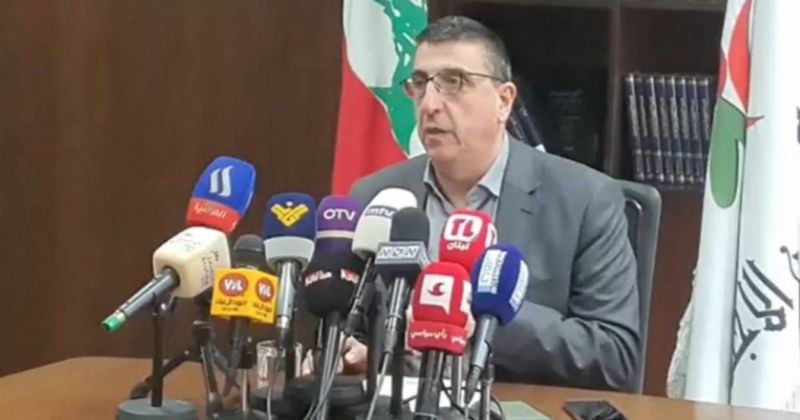
Hector Hajjar during a press conference. (Credit: ANI)
BEIRUT — On Friday, caretaker Social Affairs Minister Hector Hajjar announced that until further notice, funds allocated to impoverished families in Lebanon by the World Bank would be suspended. The funding was provided as part of the Emergency Social Safety Net Project (ESSN), also known as AMAN, launched in September 2021.
He explained that families who have been receiving aid for 18 months will therefore not be able to continue to benefit from it for the time being, while those who have benefited from the aid more recently will continue to be paid for 18 months from the start of payment.
As soon as the new $300 million in loan is officially approved by Parliament, funds will be paid to all beneficiaries of the program, up to 24 months as of the start of aid, he added.
Hajjar also said that an international donation, planned as part of another aid program to help the most vulnerable Lebanese, would be reduced by three quarters for 2024, from $147 million to $33.3 million.
Speaking to L’Orient-Le Jour, a source at the Ministry of Social Affairs said that 93,500 Lebanese households had benefited from the World Bank-funded AMAN program, which spanned 12 months starting in 2022 and was extended for twelve additional months. Selected in line with well-defined criteria and following inspection visits, each of the beneficiary households received $25 per month, plus an additional $20 per month for each family member, up to 6 members maximum per family.
In June 2023, negotiations between the Ministry of Social Affairs and other ministries in the caretaker cabinet and the World Bank led to an agreement on an additional loan of $300 million, said the source.
Following the process, as per the rules, involving the Ministries of Justice, Finance, the Interior and others, the Court of Audit, the Central Bank and the cabinet, the loan agreement was sent to Parliament to be validated by law.
The World Bank made their payment of the fund conditional on the loan agreement being adopted unamended by Parliament. However, after examining the agreement, Parliament added the following sentence: “This agreement will be implemented on the basis of a mechanism to be put in place by the cabinet.” The amendment hinders the payment process, leading to delays in the continuation of the payment of funds to beneficiary families. As long as this sentence remains in the text, the funds will not be released.
Hajjar told the press he was seeking to remedy the situation by working with caretaker Prime Minister Najib Mikati and Parliament Speaker Nabih Berri to find “an amendment mechanism.”
According to the source, a meeting between Hajjar and Mikati to this effect is scheduled for Tuesday morning.
‘Why?’
At the same time, donors (which include the European Union, Canada, Germany and Norway) had planned to provide $147 million as part of the aid program to Lebanon’s most vulnerable citizens for 2024, set up after the influx of Syrian migrants began.
However, these same donors recently informed Hajjar that this sum would ultimately amount to $33.3 million.
“In a meeting in mid-December [2023], they notified us of a decision that took effect at the beginning of the current year,” Hajjar said, expressing his sorrow for “the 75,000 families concerned, who will only benefit from donations from the international community for three months.”
Expressing his “shock” at the international community’s decision, Hajjar asked why it was taken.
“We have, however, implemented all the structural reforms that were requested, in particular the unification and digitization of social protection-linked data. At the donor countries’ request, we also developed a social protection strategy, which we signed in the cabinet. All that remains is the launching process,” he said.
“Was the issue of Syrian migrants resolved?” he asked, adding that if the Syrians were to return to Syria, Lebanon would “agree not to receive any aid.”
“Is this how to reward the country for welcoming more than 2,000,000 migrants without any conditions or constraints?” he asked indignantly, calling on political and religious authorities and trade unions to act for the sake of “the poor in Lebanon.”
On Monday, Hajjar met with European Union ambassador Sandra de Waele, to discuss the restrictions imposed by donor countries.
One of the reasons given for the reduction in aid to Lebanon is the international community’s commitment to provide financial aid to Ukraine.
This article was originally published in French in L'Orient-Le Jour. Translation by Joelle El Khoury.
It also stated that the program was extended for 6 months. The correct information is that is was extended for 12 month, and it was amended on Jan 24.